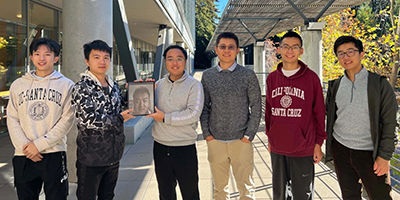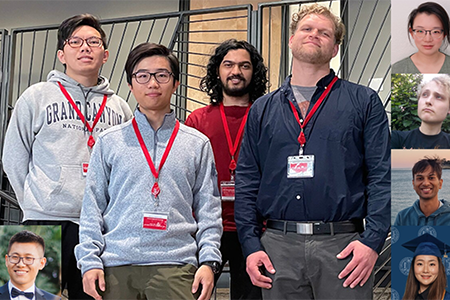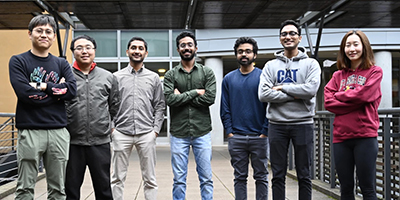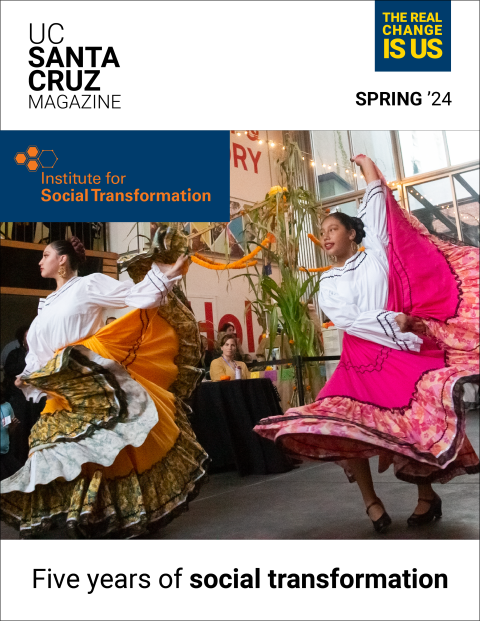Through the transformative power of artificial intelligence (AI), Amazon Alexa products are advancing every day. To provide students hands-on opportunities to develop smarter, more efficient, and more collaborative conversational AI systems to power their Amazon Alexa agents, Amazon created three university competitions: SimBot, SocialBot, and TaskBot.
Although each of the three challenges tasks teams to develop an AI-powered bot for a specific purpose for a chance to win $500,000 or more, they all aim to advance the fields of conversational embodied AI, natural language generation, and human-AI interaction.
UC Santa Cruz was one of only two universities—along with Virginia Tech—selected to compete in all three Alexa Prize competitions, and is now the only university still active in all three. The UCSC teams competing in the SimBot and SocialBot competitions are currently top ranked, and the TaskBot challenge is just getting underway.
“I’m very proud of every team member,” said Xin (Eric) Wang, assistant professor of computer science and engineering and the faculty advisor for the three UCSC teams. “All three teams are doing a great job of working together, splitting up tasks, and finding new ways to improve the overall performance of the bots.”
SimBot Challenge
The inaugural SimBot competition seeks to advance virtual assistant technology by developing a next-generation bot capable of completing real-world tasks, like preparing breakfast or cleaning a room, while continuously learning from its environment so it can perform commonsense reasoning.
“Our bot combines learning-based systems and symbolic reasoning systems to jointly interact with humans and complete tasks,” Wang said. “Both the conversational element and developing a modular system is crucial for not just this competition, but for all three.”
SlugJARVIS, a team of UCSC computer science and engineering Ph.D. students who work in Wang’s lab, was one of 10 university teams selected globally to compete in the 2022–23 SimBot competition. After winning the public benchmark phase last spring, the team has continued to excel in the competition and recently advanced to the finals. The final five teams will compete for a chance to win half a million dollars.
“The best part of being SlugJARVIS’s team lead is collaborating with my awesome team members to explore embodied AI research and deploy that to be used by Amazon customers,” said Jing Gu, a computer science and engineering Ph.D. student at the Baskin School of Engineering.
Any Amazon Alexa customer can interact with one of the 10 SimBots by saying, “Alexa, play with robot" on Echo Show or Fire TV devices. Once connected to a randomly selected bot, customers direct bots to complete increasingly difficult tasks in a virtual environment. At the end of the interaction, customers have the chance to anonymously rate and provide feedback on the bot’s performance, which plays into the overall rankings and gives the team a chance to improve their bot’s performance as the competition continues.
SocialBot Challenge
UC Santa Cruz’s Team Athena was one of nine teams selected for the fifth Amazon Alexa SocialBot Grand Challenge, a competition focused on designing a bot that is capable of carrying out 20-minute coherent and engaging conversations on a wide range of topics with Alexa customers. This is the fourth time UCSC has been selected to compete in this competition.
This year’s Team Athena has focused on reviving their previous SocialBot and enhancing it with human-in-the-loop-based learning models and neural language understanding aimed at recognizing the intent of the human customer and preparing the bot to converse on any topic.
Separate prizes will be awarded for teams achieving the best overall performance and teams demonstrating the greatest scientific invention and innovation, with prizes up to $250,000 for the top-finishing team in each of those prize categories.
Team Athena lead and computer science and engineering Ph.D. student Yue Fan is excited about improving their current system.
“The Athena SocialBot is an accumulation of all modules that were built over the past few years, so there is a lot already there that we can work with and improve upon,” Fan said. “We’re most interested in employing neural based language models to advance the bot’s ability to engage customers in longer and more interesting conversations.”
The SocialBot Grand Challenge live-interaction phase has just begun and Team Athena is already at the top of the scoreboard. Amazon Alexa customers can chat with the team bots by saying, “Alexa, let’s chat,” which randomly connects them with one of the nine bots in the competition.
TaskBot Challenge
The second TaskBot Challenge began in early 2023. Team UCSC, also known as Team Sage, is competing for the first time. Comprised of both Baskin Engineering undergraduate and graduate students and led by computer science and engineering Ph.D. student Kaizhi Zheng, Team Sage is one of 10 teams selected for this competition. The team is developing a system that can assist humans in completing complex tasks, like fixing a car or cooking a meal.
“Our goal is to build a human-friendly interface that allows for a seamless and intuitive experience,” Wang said.
The TaskBot will guide humans in completing multi-step tasks by providing thorough instructions via a multimodal format, incorporating a mix of videos, images, text, and audio.
Team Sage has recently completed the challenge’s bootcamp and passed the required skills test. The next phase of the competition, beginning this spring, will be to put the bot online for testing. When the live-interaction phase begins, any Amazon Alexa customer can interact with one of the 10 TaskBots by saying “Alexa, let’s work together” on Echo Show or FireTV devices.
To follow the progress of all three UCSC teams, visit the Amazon Alexa Prize website.





